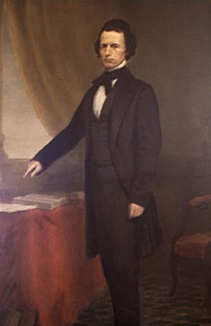1805-1859
The portrait of Nicholas Hill that hangs in Court of Appeals Hall Albany is one of the very few that honors an attorney. Perhaps equally rare is the memorial published in the New York Official Reports on his death. Strangely, few know of Nicholas Hill’s contribution to the New York Bar apart, that is, from his reputation for having argued more cases before the New York Court of Appeals than any other lawyer, a statistic that covers the time from the Court’s first session in 1847 to Hill’s untimely death in 1859.
Nicholas Hill, Jr. was born in Florida, Montgomery County, New York, in 1805, the ninth child in a family of 18 children. As a young man, he supported himself by teaching school while he studied law, first in Montgomery County and later in Schoharie County. Following his admission to the Bar in 1829, he practiced for a time in Amsterdam, New York, before moving to Saratoga Springs where he joined Judge Esek Cowen in writing a commentary on Phillips on Evidence. This work was published under the title of Cowen & Hill’s Notes in 1839, and was very well received by the Bar. Hill was appointed District Attorney of Saratoga County in September, 1836, but left office after a short time. He was appointed State Reporter in 1840, the fifth in the history of the State to hold that office, and in the years between 1840 and 1845, he issued seven volumes of reports of the decisions of the Court of Errors and the Supreme Court.
In 1844, Nicholas Hill formed a law partnership with Peter Cagger and John K. Porter (later a Judge of the Court of Appeals) known as Hill, Cagger & Porter, and confined his practice to the argument of cases on appeal, many of which resulted in important decisions. Among them were Silsbury v. McCoon (3 N. Y. 379), where corn taken from the owner by a willful trespasser was used to make whiskey. The question before the Court was the ownership of the spirits, and the Court upheld the corn owner’s right to the whiskey. Sadly, the corn owner’s creditor (also a party to the case) was awarded possession of the whiskey in satisfaction of a debt.
In another case, McMahon v. Harrison (б N. Y. 443), Mr. Hill successfully contended that a professional gambler was “incompetent by reason of improvidence,” and thus prohibited from obtaining letters of administration, even though evidence adduced showed — up to the time the testimony was given — the gambler had been remarkably successful.
Mr. Hill was counsel for the respondent in the landmark case of Thomas v. Winchester (6 N.Y. 397 [1852]). The plaintiff, Mrs. Thomas, had been prescribed extract of dandelion by her physician, and she had purchased the medicine from a drug store in Cazenovia, New York, which in turn was a remote purchaser. Mrs. Thomas took the extract as directed, but instead of being restored to health, she became gravely ill. It turned out that the bottle contained the poison belladonna and the manufacturer had incorrectly labeled it dandelion extract. In its decision, the New York Court of Appeals expanded the doctrine of privity of contract to enable the end-user of a defective product to recover for injuries sustained through using it.
The last case argued by Mr. Hill in the Court of Appeals was that of Olcott v. Tioga Railroad Company (20 N. Y. 210), which was not decided until after his death. He argued that legislative intent is controlling and overrides the strict grammatical import of isolated words or phrases. He maintained that this doctrine was especially important in the interpretation of the Statute of Limitations where the provision in question was intended to preserve a claim. The Court sustained Mr. Hill’s position, reversed the judgment of the court below in favor of the defendant, and overruled the case of Faulkner v. Delaware & Raritan Canal Co., decided by the New York Supreme Court (1 Denio, 441).
On May 26, 1859, the Bar of the City of New York met at the Hall of the Supreme Court to mark the death of Nicholas Hill, Esq. “On motion of Mr. John Mckeon, Mr. Justice Nelson, of the Supreme Court of the United States, was called to the chair. On motion of Mr. John Van Buren, Judge Betts, United States District Court; Mr. Justice Roosevelt, Presiding Justice Supreme Court; Chief Justice Bosworth, Superior Court; and First Judge Daly, Common Pleas, were appointed Vice-Presidents.” In the Proceedings it is noted that the style of Nicholas Hill’s writing was characteristic of the man. “His points of argument indicated great powers of analysis and remarkable labor; but his argument was simple, lucid, forcible, enriched by illustrations from history and literature, and imbued with the spirit of legal philosophy.”
Mr. Hill was survived by his widow and two children. His only surviving son, Edward Bayard Hill, admitted to the Bar in Albany shortly before the Civil War, immediately volunteered for military service. He was a lieutenant in command of a battery in the first Bull Run battle and was credited with saving his battery and “bringing it back to the Union lines uncaptured and unsurrendered.” On June 13, 1862, Edward died of injuries sustained in the battle of Chickahominy.
Sources
Hon. Matthew Hale. Nicholas Hill. The Green Bag, Vol.8, p185 (May 1896). Digital version available in Google Books.
Committee of the Bar of the City of New York. Memoir of Nicholas Hill, a Member of the Bar of New York: Who Died in the City of Albany, on the 1st of May, 1859 (1859). Digital version available in Google Books.

